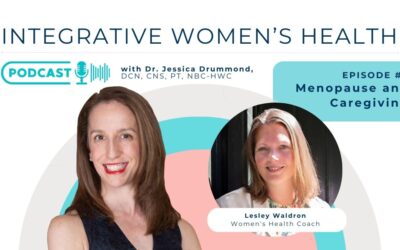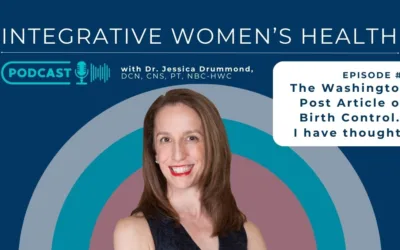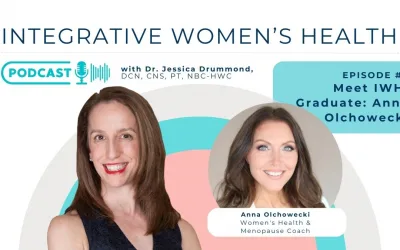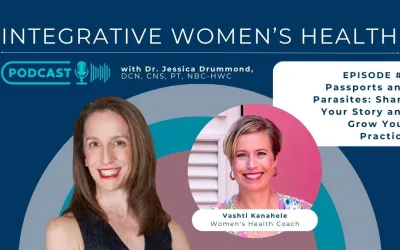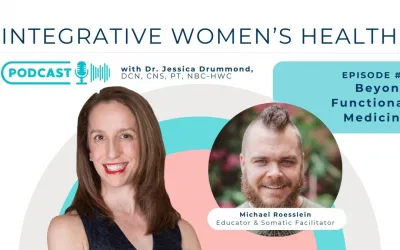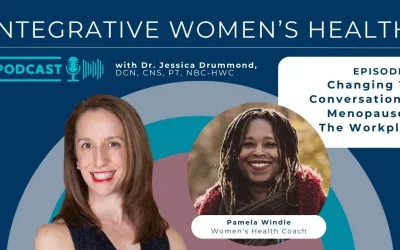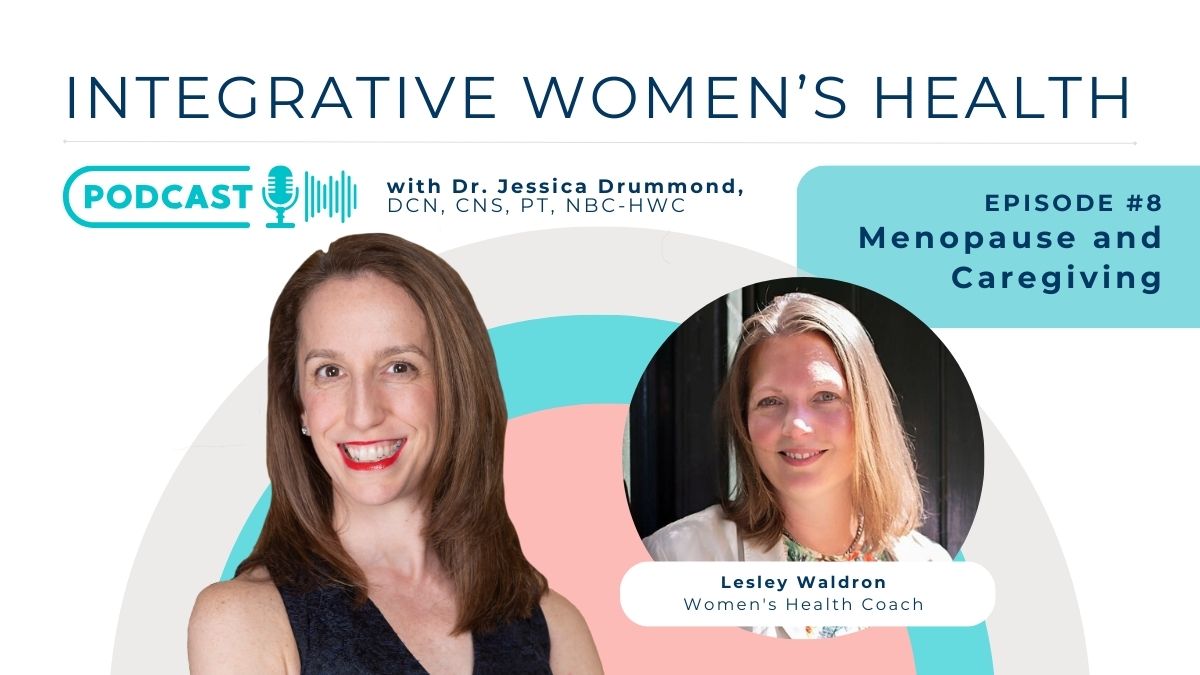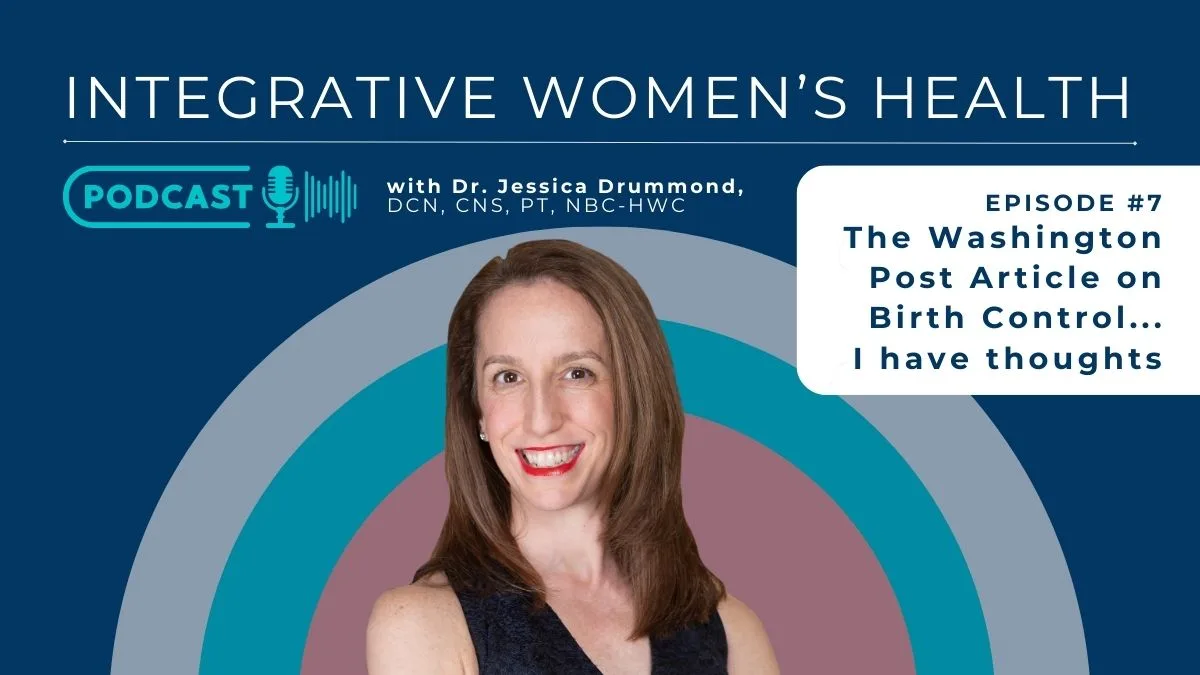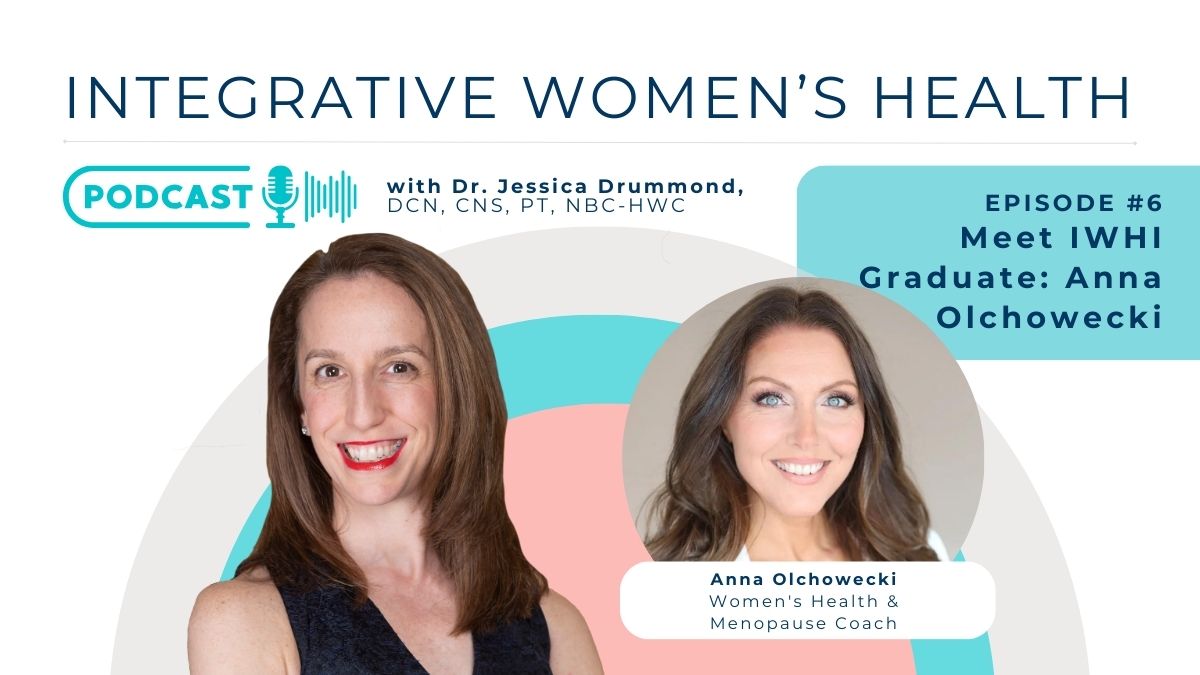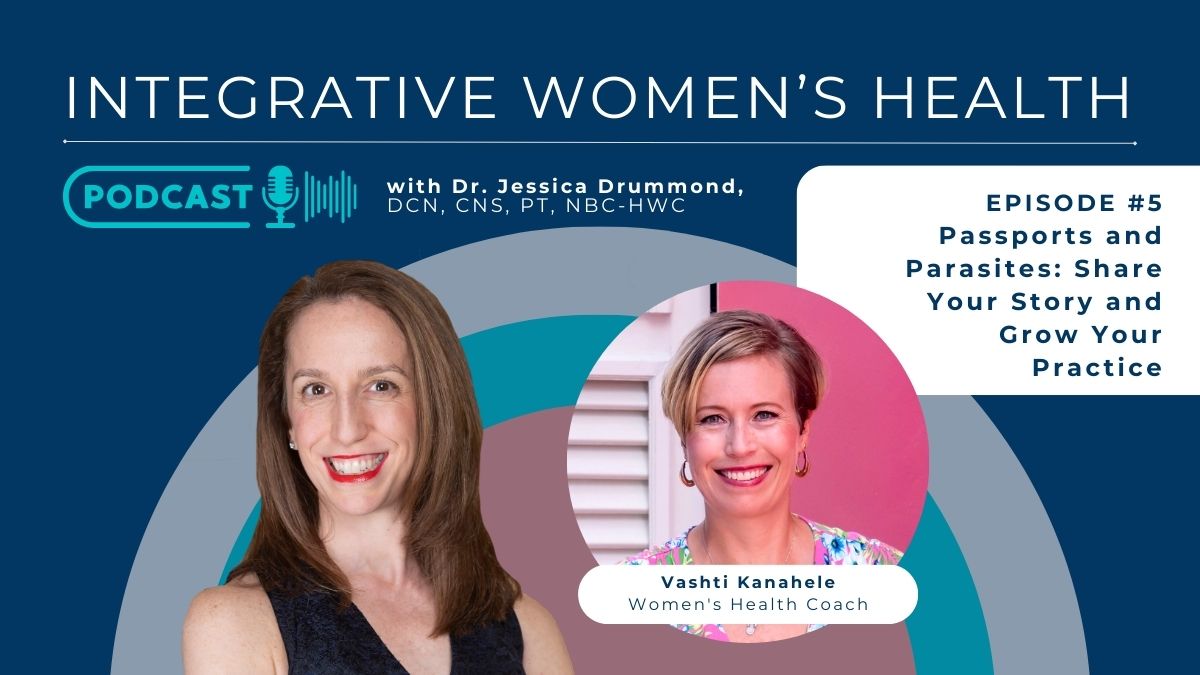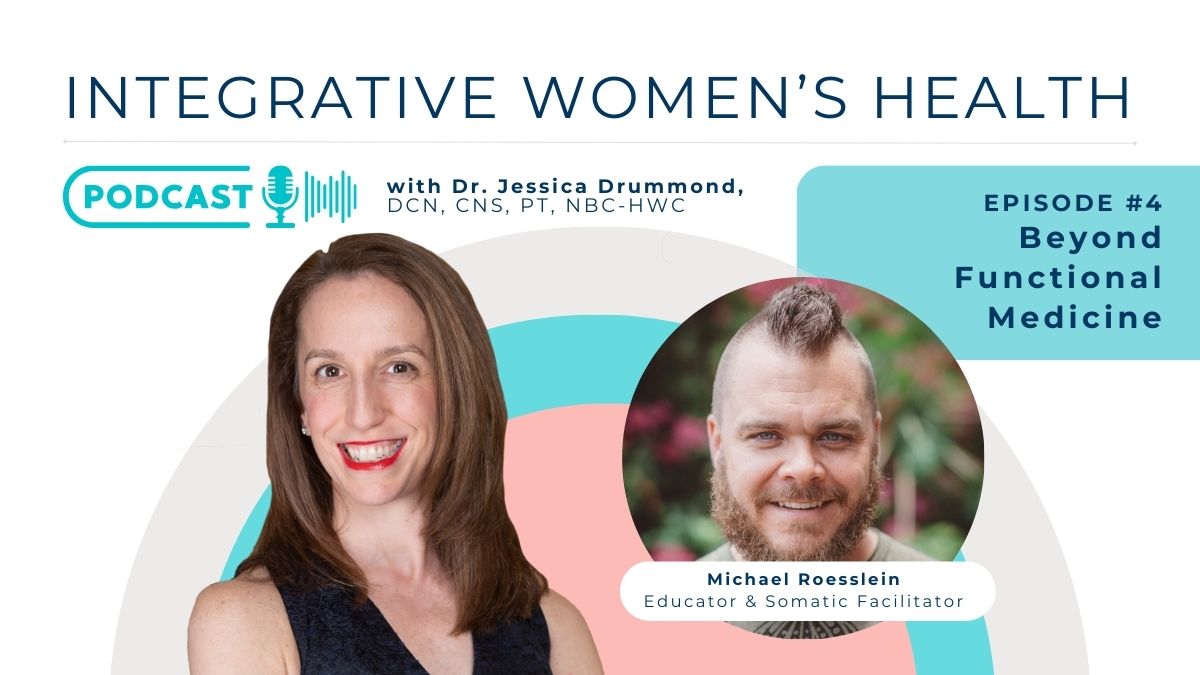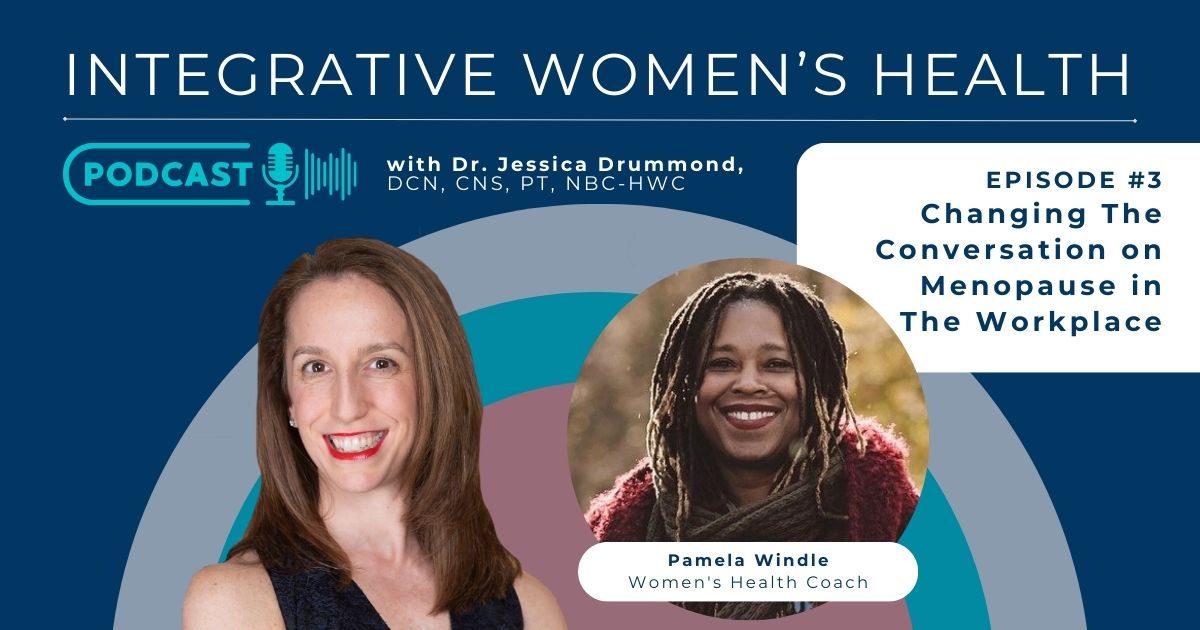Curious about the differences between a certified health coach and an uncertified “Instagram coach”? Dr. Jessica Drummond and Dr. Dawn Allen dive deep into the key differences in the video below!
If you are passionate about promoting wellness and helping women achieve their health goals, a career in women’s health coaching may be the perfect fit for you.
With more and more women seeking guidance on improving their physical and mental well-being specifically for challenges like infertility, PCOS, endometriosis, hormone imbalances, thyroid issues, autoimmunity, perimenopause and menopause, and longevity, the demand for qualified women’s health coaches is on the rise.
In this article, we’ll explore what women’s health coaching entails, the skills required to succeed in this field, the education and certification requirements, career opportunities, and the pros and cons to consider before embarking on this career path.

TRADITIONAL WOMEN’S HEALTHCARE IS NOT ENOUGH.
Discover how Women’s Health Coaches help to fill the gaps in the healthcare system and provide integrative support to the countless women who are not receiving the quality of care that they deserve.
Curious about learning more? Take our assessment!
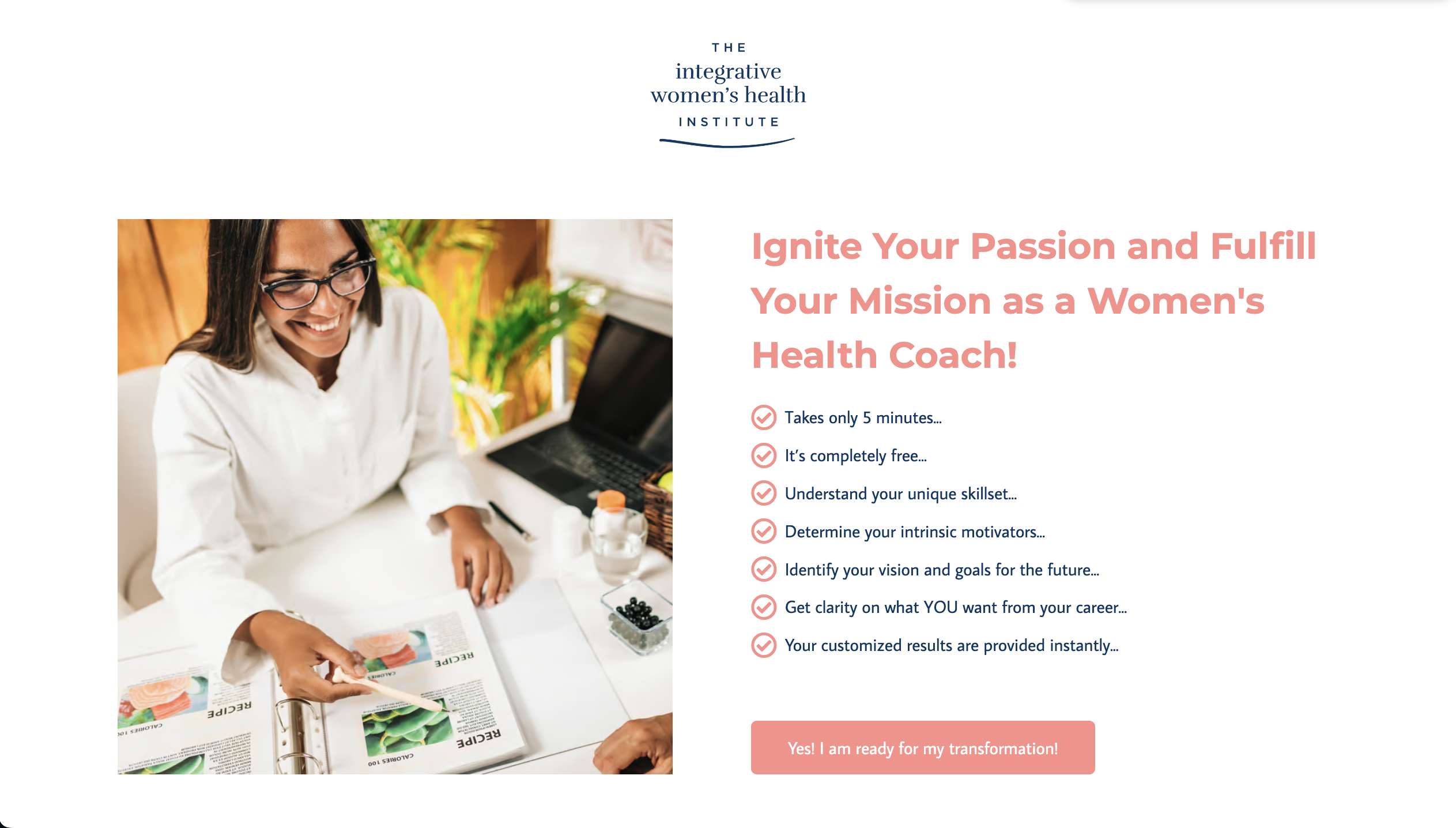
Understanding Women’s Health Coaching
Before we dive into the specifics of what a women’s health coach does, it’s important to understand what women’s health coaching is all about.
At its core, women’s health coaching is a holistic approach to healthcare that focuses on helping women make sustainable lifestyle changes to achieve optimal physical and emotional well-being.
The coaching process typically involves working closely with clients to identify their health goals, providing education and support on healthy habits and behaviors, and offering guidance and encouragement to help them stay on track.
What is Women’s Health Coaching?
Women’s health coaching is an evolving field that draws on a range of disciplines, including nutrition, fitness, psychology, and wellness.
The aim of women’s health coaching is to empower women to take charge of their health and well-being by developing healthy habits that are sustainable over the long term.
A women’s health coach is a trusted advisor who provides personalized guidance, support, and accountability to clients who want to improve their health and wellness.
Women’s health coaching is not just about helping women lose weight or get in shape. It’s about helping women achieve optimal health and well-being in all areas of their lives.
This includes physical health, emotional health, relationship health, and spiritual health.
Women’s health coaches work with clients to identify their unique needs, challenges, concerns, and goals, and then develop customized plans to help them achieve those goals.
One of the key benefits of women’s health coaching is that it provides a safe and supportive environment for women to explore their health and wellness goals.
Women’s health coaches are trained to listen actively and provide non-judgmental support and guidance. This can be especially helpful for women who may feel overwhelmed or intimidated by the prospect of making lifestyle changes on their own.
Everyone needs support to maintain long-term accountability, and women’s health coaches are experts at providing that support for women aiming to overcome acute or chronic health challenges.
The Importance of Women’s Health Coaching
There are many factors that contribute to the importance of women’s health coaching. For one, women face unique health challenges that require specialized attention and support.
Women are more likely than men to experience chronic health issues such as autoimmune diseases, depression, and anxiety.
Additionally, women often have to balance the demands of work, family, and social life to a greater extent than their male counterparts, which can make it challenging to prioritize self-care.
Women’s health coaching provides a holistic, client-centered approach that takes all of these factors into account, helping women achieve their health goals and maintain optimal wellness.
Another important aspect of women’s health coaching is that it helps women develop sustainable habits and behaviors. Many women struggle with inconsistency with implementing healthy behaviors, a mindset of “punishment” for taking imperfect health action, or other unhealthy patterns that can be difficult to break.
Women’s health coaches work with clients to identify the underlying causes of these patterns, and then develop strategies to help clients make lasting changes.
This can include everything from scheduling specific health behaviors, hiring the right collaborative medical team, and participating in consistent exercise practices to stress management techniques and self-care practices.
Women’s health coaches play a crucial role in helping women achieve their health goals and live a healthy, fulfilling life.
Women’s health coaching clients come with a wide variety of health goals from overcoming a complex chronic illness or navigating a new injury or diagnosis to maintaining a healthy weight or having enough energy to meet her important life performance goals from sports to parenthood to the executive suite.
The job of a women’s health coach is not just about creating a personalized wellness plan, but also about educating and supporting clients on healthy lifestyle habits.
When working with clients, a women’s health coach first assesses the client’s health needs and goals. This involves gathering information about the client’s medical history, lifestyle, daily health habits, and current health status.
Based on this information, the coach creates a personalized wellness plan that is tailored to the client’s needs. The plan may include recommendations for nutrition, exercise, stress management, sleep, and other supportive health habits.

Skills for Success
To be a successful women’s health coach, it’s important to have a unique set of skills and qualities. Effective communication skills are essential, as the coach must be able to clearly explain health concepts and motivate clients to make positive changes.
Strong interpersonal skills and empathy are also important, as the coach must be able to build trust and rapport with clients.
A solid understanding of health and wellness principles is necessary, as is the ability to create personalized wellness plans tailored to the client’s needs.
Finally, a passion for helping others achieve their health goals is essential, as this job requires a deep commitment to the well-being of clients.
In conclusion, women’s health coaches play an important role in helping women achieve their health goals and maintain a healthy, sustainable lifestyle. With the right skills and qualities, you can make a real difference in the lives of your clients and help them live their best life.

Educational and Certification Requirements
Women’s health coaching is a dynamic and rewarding career path that requires a combination of education, certification, and ongoing professional development.
As a women’s health coach, you will work with clients to help them achieve their health goals, improve their overall well-being, and make positive lifestyle changes.
Necessary Degrees and Certifications
If you are interested in becoming a women’s health coach, there are several educational and certification requirements to consider. The Integrative Women’s Health Institute’s Women’s Health Coach Certification Program requires an associate’s degree or 2,000 hours of work experience in any field.
These requirements are flexible, but the most important prerequisite is a curiosity about living healthfully, a love for learning, and a passion for women’s health and wellness. These prerequisites are essential for setting yourself up for success in your certification program.
Completing a health coaching certification with National Board of Health and Wellness Coaches (NBHWC) board certification eligibility, such as The Women’s Health Coach Certification, will provide you with the widest available opportunities for business and career success in the field.
Continuing Education and Professional Development
As with any healthcare profession, continuing education and professional development, including meeting regular recertification requirements, are essential components of a successful career in women’s health coaching. Women’s health coaching is a constantly evolving field, with new research and trends emerging all the time.
The Integrative Women’s Health Institute offers continuing education opportunities to help coaches stay up-to-date with the latest trends and research in the field. These opportunities include online courses, certificate programs, live coaching calls with our CEO, faculty, and guest speakers, webinars, and workshops. Coaches can also attend online and in-person professional meetings and conferences to network with other professionals and gain additional knowledge and skills.
By staying current with the latest research and trends in women’s health coaching, coaches can provide their clients with the most inspiring, effective and evidence-based coaching services possible.
Overall, becoming a women’s health coach requires a combination of education, certification, and ongoing professional development. If you are passionate about helping others achieve their health goals and are committed to lifelong learning, a career in women’s health coaching may be the perfect fit for you.
Career Opportunities and Job Outlook
This growth is driven by the increasing demand for healthcare services and the emphasis on preventive healthcare. Women’s health coaching is a promising career path that offers numerous opportunities for growth and advancement.
As a women’s health coach, you will have the opportunity to work with tween and teen girls and women of all ages and backgrounds. Plus, some of our graduates also focus on men’s pelvic or sexual health or couples health.
You will help your clients navigate their health journey, providing guidance and support along the way. Whether you work in a hospital, clinic, gym, wellness center, or private practice, you will have the opportunity to make a positive impact on the lives of your clients.
One of the benefits of working as a women’s health coach is the flexibility it offers. Many coaches work remotely, providing coaching services online or via telehealth platforms.
This allows you to work from anywhere in the world and reach clients from all over the globe. Plus, this gives you the flexibility to create your own schedule giving you financial and time independence.
Job Growth and Salary Expectations
The job outlook for women’s health coaches is promising, with a projected growth rate of 13% from 2019 to 2029. This growth is higher than the average for all occupations, which is 4%. This means that there will be plenty of job opportunities available for those who are interested in pursuing a career in women’s health coaching.
In terms of salary expectations, the median annual salary for health educators and community health workers was $46,910 in 2020, according to the Bureau of Labor Statistics. However, as a women’s health coach, your salary may vary depending on your level of experience, the setting in which you work, and the geographic location of your practice.
Our women’s health coach graduates who work in private practice settings or who work for digital coaching have salaries ranging from $75,000 – $150,000 per year.
Our graduates who create their own private practices, create large scale group coaching services, speak publicly, or develop and market their own products make in the range of $50,000 – $500,000 per year or more.
Overall, women’s health coaching is a rewarding and fulfilling career that offers numerous opportunities for growth and advancement. Whether you are just starting out in your career or are looking to make a career change, women’s health coaching may be the right path for you.
Pros and Cons of a Career in Women’s Health Coaching
As with any profession, there are pros and cons to consider before pursuing a career in women’s health coaching.
The Benefits of Being a Women’s Health Coach
- The ability to make a meaningful difference in clients’ lives
- A flexible schedule and the option to work remotely
- The growing demand for qualified women’s health coaches
- The opportunity to work in a variety of settings, with a team of multidisciplinary professionals, and with diverse populations
- The potential for personal and professional growth
Challenges and Drawbacks to Consider
- The heavy emotional load of working with clients who may be struggling with chronic health issues or other challenging life circumstances
- The need to stay up-to-date with the latest research and industry trends
- The time and financial investment required to obtain the necessary education and certifications
Women’s health coaching is a fulfilling, but demanding career. In The Women’s Health Coach Certification community, we support our students and graduates with tools for their own health, emotional support, nervous system regulation, and more to reduce the risk for compassion fatigue, burnout, or overwhelm. Healthy and fulfilled coaches are happier and provide better care for their clients.
Here at The Integrative Women’s Health Institute, your physical, emotional, relational, and spiritual health is a key priority for us as you navigate your training and progress through your career. Our community provides support and resources for you long after you’ve received your graduation certificate.
Is Women’s Health Coaching for YOU?
If you are passionate about health and wellness and enjoy helping others achieve their goals, a career in women’s health coaching may be an excellent choice for you.
With a growing demand for qualified women’s health coaches, there are numerous opportunities for growth and advancement in this field. It’s important to carefully consider the education and certification requirements, as well as the potential challenges and rewards of this career path.
With dedication, hard work, and a commitment to ongoing learning and development, you can build a fulfilling and successful career as a women’s health coach.
Revolutionize Your Career:
Become a Board-Certified Women’s Health Coach
In this NBWHC accredited health coach training program, learn the foundations of health coaching, functional nutrition, and integrative health strategies specifically designed for women.
Plus, an entire component is dedicated to business training to teach the best strategies to build a thriving health coaching practice.

Founder & CEO
Dr. Jessica Drummond,
DCN, CNS, PT, NBC-HWC
Dr. Jessica Drummond, DCN, CNS, PT, NBC-HWC, is the founder and CEO of The Integrative Women’s Health Institute, The Outsmart Endo Health Coaching Program, and the creator of the Women's Health Coach Certification.
She is passionate about caring for and empowering people who struggle with women’s and pelvic health concerns. She is equally passionate about educating and supporting clinicians and wellness professionals in confidently and safely using integrative tools to transform women’s and pelvic healthcare.
Dr. Drummond has two decades of clinical experience as a licensed physical therapist, licensed clinical nutritionist, and board certified health coach working with women with pelvic pain, including endometriosis, vulvodynia, and bladder pain syndrome. She brings a unique, conservative, and integrative approach to supporting women to overcome hormonal imbalances, and chronic pain conditions.
She is a sought after international speaker on topics such as integrative pelvic pain management, natural fertility options, optimal hormone health, menopause, and female athlete nutrition. Dr. Drummond was educated at the University of Virginia, Emory University, Duke Integrative Medicine, and Maryland University of Integrative Health.
Read Related Posts from The Integrative Women's Health Institute Blog:
Download The WHC Program Guide!
Enter your information to download your copy The Women’s Health Coach Certification Program guide.

